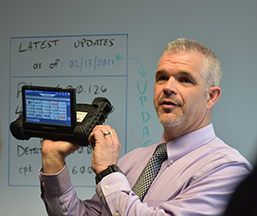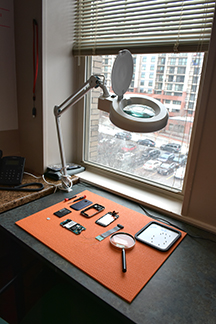By Beth David, Editor
Flanked by police chiefs and state police troopers from around the county, Bristol County District Attorney Thomas M. Quinn III unveiled a new digital forensics crime lab on Thursday, 2/16, in New Bedford.
The new “Digital Forensics Investigatory Lab” puts in the same space a variety of equipment that the DA’s investigators use to get information from various electronic gadgets, enhance the use of video to investigate crimes, and other digital equipment.

Sgt. Michael Bates of the Mass. state police holds up a device that allows him to crack the passwords of various cellphones and tablets. Photo by Beth David.
Some equipment is new, some upgraded, and some has been in use for some time, said Mr. Quinn. What the new lab does is put the equipment in a central location, and creates a quiet place for investigators to work.
The lab will be available to all police departments in Bristol County. If they have a case that requires getting into a locked phone a tablet or computer, they can turn to the lab for assistance.
Mr. Quinn said that over the past decade investigators have become “more and more aware of that fact that some form of digital evidence is being used in our investigations in crimes of all types.”
The DA’s office has sent a number of state troopers to be trained in digital forensics in the past few years. Those troopers will be the ones who work in the lab, assisting police departments from throughout the county.
“As you may be aware, the technology is constantly changing,” said Mr. Quinn.
After sending troopers to training and upgrading equipment, he said the DA’s office is “extremely well prepared to handle almost any digital forensics evidence handed to them.”

A work station in the lab where a cell phone was disassembled. Photo by Beth David.
The unit is headed by Sgt. Michael Bates of the state police.
Mr. Quinn said the majority of digital evidence comes from phones and tablets, but increasingly includes cell tower data and other online sources. He said the new lab will be able to extract information from all those devices for use in an investigation. In addition to phone calls, there are texts, emails, and social media accounts that could be helpful in an investigation.
Mr. Quinn used several recent cases as examples of how digital forensics was required, including the Aaron Hernandez murder trial in Attleboro, and the murder trial of Joshua Silva, who was convicted in 2015 of killing Joyce Howland in her Fairhaven home in 2013.
In the Silva case, the video of Mr. Silva’s truck driving along Route 6 was critical to the case, providing a timeline for the murder. Video behind the Pasta House also helped to identify and tie Mr. Silva to the crime.
Staying current on techniques and having updated equipment is critical considering how quickly technology evolves.
“Due to this new partnership with our local police departments, I strongly believe that the people of Bristol County can be proud of the fact that we are fully prepared to meet the challenges presented by 21st Century technology,” said Mr. Quinn.”
The cost of program is not huge, said Mr. Quinn, adding it is in the thousands, not the tens of thousands. The money comes from funds obtained by the drug forfeiture unit, and by regular equipment budgets.
Mr. Quinn said the department will continue to enhance the unit’s capabilities as technology changes.
“We are committed to keeping this up-to-date and improving on the equipment,” he said.
The new equipment does not, however, give investigators any more rights to private information.
The police will still need a warrant or permission from the owner to access information.
Generally, cell phones and other electronic gadgets are placed in special bags to keep them from being accessed remotely until a warrant can be obtained. In the lab, they are transferred to a box that has gloves attached, allowing investigators to work on a phone without taking it out of the protective case.
“In a reasonable way, we need to have access to this information, with probable cause,” said Mr. Quinn.
Down in the lab, tables had a disassembled cellphone and some of the equipment on hand for reporters to see first hand.
Some equipment can break into a cell phone, even a smart phone, by bypassing the password.
Sgt. Bates admitted, though, that Apple iPhones are still tough to get into.
He said just a few years ago it was desktop computers, then laptops, now phones that have all the information in them.
He said his lab is “very portable.”
They can take equipment to crime scenes, and then bring gadgets back to the lab if necessary, for further inspection.
Fairhaven police chief Michael Myers said the lab allows his department to have more resources for their investigations.
He said there are any number of cases at any given time that will use the resources of the lab.
“We have some capabilities,” said Chief Myers, but added that keeping up with software updates can get expensive. “Different phones all have different software. If it’s beyond our means, we will go to them.”
Sgt. Bates said the extra training does not come with any extra pay or shifting of duties.
“It’s a passion,” he said. “We’re overloaded but we love it. It’s crucial to every case.”
Click here to download the entire 2/23/17 issue: 02-23-17 KoolKids



